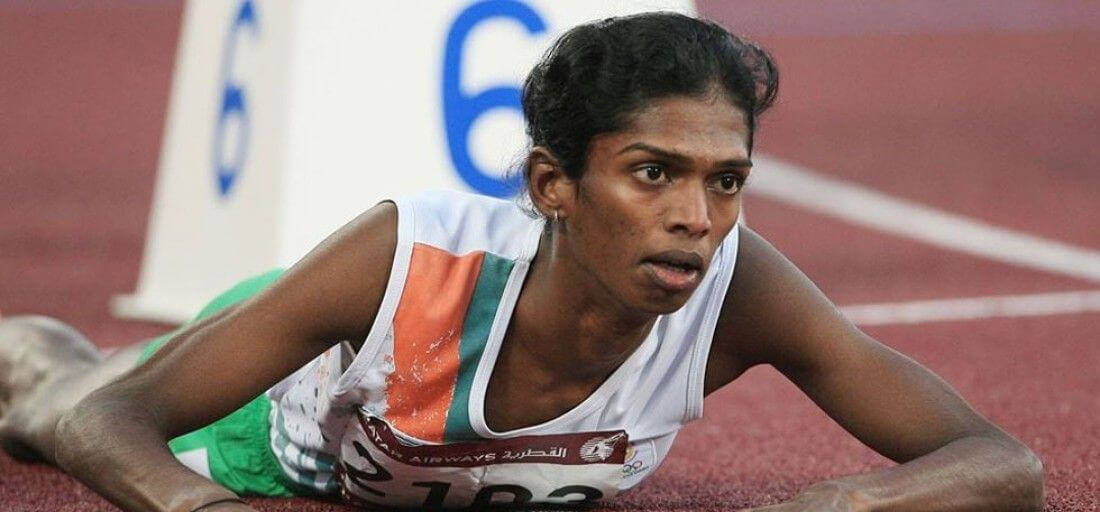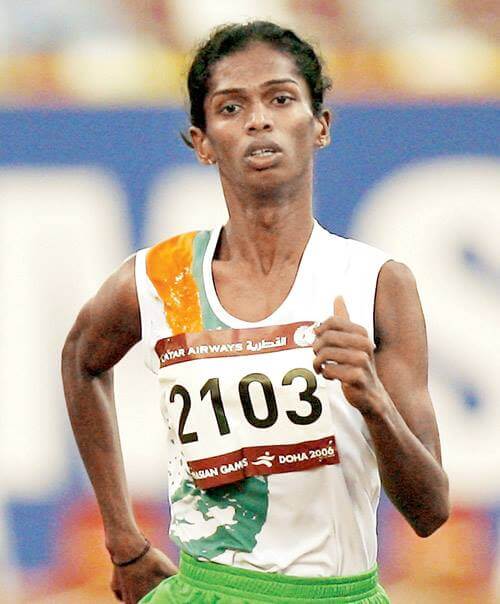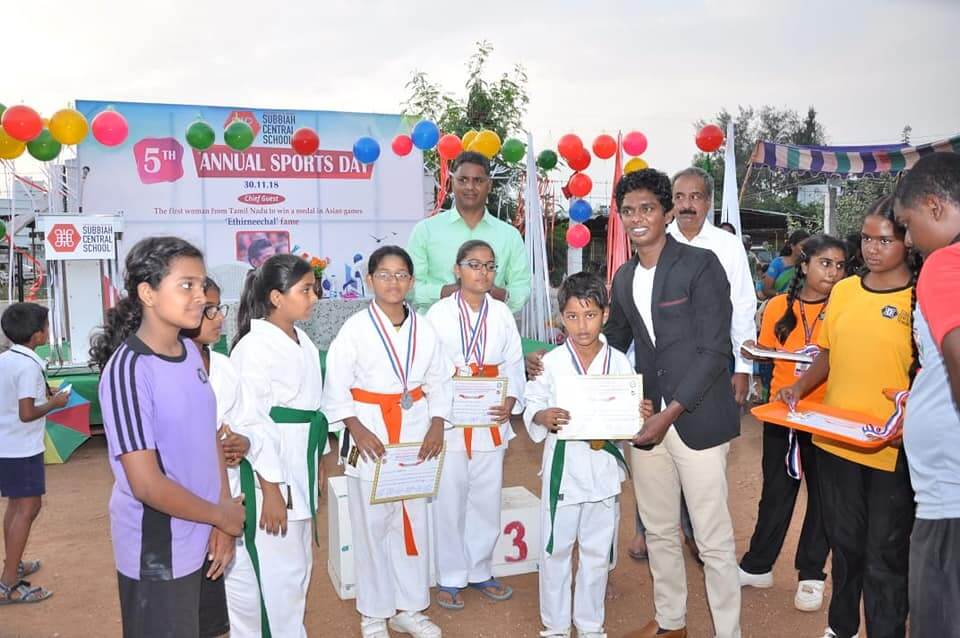Athletics
How Santhi Soundarajan was let down by India "for not being a woman"

The Indian story on the fight to run starts from Santhi Soundarajan. The middle-distance runner, her quick rise and fall, had rocked the athletics world twelve years ago. She was born in Kathakuruchi village in Pudukkottai district of Tamil Nadu to Dalit parents who were engaged in daily labour at a brick kiln Her mother and father had to go to another town to work in the brickyard. She had to overcome malnutrition as a child. She grew up in a 20/5 ft hut across the road from the home she lives in now. The home had no bathroom or outhouse, running water or electricity.
Amidst all this, Soundarajan's taking up running seems to have been destined. It so happened that while the parents were gone, Soundarajan, the eldest, was in charge of taking care of her four siblings. There were times when her grandfather, an accomplished runner, helped while her parents were away.

When she was thirteen, he taught her to run on an open stretch of dirt outside the hut. He also bought her a pair of shoes. 'I come from a rural background where very few games like kho kho and kabaddi are played. These are the games which don't require expensive equipment or facilities. Running was my natural strength. My grandfather was an athlete who provided me with the drive to develop my skills. Moreover, I saw athletics as a sport that gives an opportunity to the economically underprivileged to make their mark, more than in any other sport,' she says.
When we try to unravel her entire journey, it's difficult to point out the reason that kept her going, irrespective of the setbacks she faced in her life. If her grandfather was her mentor, her mother was her pillar of strength. 'My mother, Manimegalai, is my pillar of support. I am able to overcome the challenges faced every day only because of her. As every other child would. I want to keep my mother happy too. Every time I think of giving up. I think of her and the many struggles she has faced. It fuels me to keep "running" in life,' she says.

The girl started winning prizes at school sports events. At her first competition, in the eighth grade, Soundarajan won a tin trophy. 'Nothing great, tumblers, glasses and things like that,' she says, laughing. But more than anything else, they worked as an incentive for her to work hard. The sports coach at a nearby high school took note of her performance and recruited her. The school paid her tuition fees and provided her with a uniform and lunches.
In this manner, Soundarajan started taking three daily meals for the first-ever time in her life. After high school, she got a scholarship from an arts college in Pudukkottai, the nearest town. In the following year, she got transferred to a college in Chennai, which was seven hours away from her home. The medals followed her as she graduated from one level to another.
Soundarajan won 11 international medals for India. This includes the 800 m silver at the Asian Athletics Championships in South Korea in 2005 and the 1500 m gold at the South Asian Games in Colombo in August 2006. She was declared the best athlete at the National Open Championships in New Delhi in September 2006. However, the 2006 Asian Games in Doha was the big chance that she had been waiting for.
The twenty-five-year-old Soundarajan ran the 800 m as if her life depended on it. She fell flat on the track and looked up at the sky. After this, she looked at the cameras in utter disbelief. She won a silver medal in the women's 800 m race at the 2006 Asian Games, clocking 2 min 3.16 sec.
She lost the medal in two days. From the news on television, she got to know that she had failed the 'gender test! Till then, she had no inkling as to what the test was all about.
Dr Arun Kumar Mendiratta, the chairman of the Athletics Federation of India (AFI) Medical Commission, brought her in for the gender tests but did not tell her the reason. This was a day after her victory. The report sent to the Indian Olympic Association said, 'Soundarajan does not possess the sexual characteristics of a woman.' Lalit Bhanot, the then secretary of AFI, conveyed to her on the phone that she had to stop competing.
Soundarajan says, 'The officials made me sign some papers in English, a language I have trouble reading and speaking in. I was stripped of my Asian Games silver medal and didn't get the prize money.'
As the loss of the medal started sinking in, her life changed. She had to return to her village. She had to face humiliation at every stage. Probing looks and nasty comments about her gender identity made her vulnerable. She went into depression and attempted to kill herself by ingesting a type of poison used by vegetarians. A friend found her vomiting uncontrollably and took her to the hospital.
'I was shattered by the failed test. The AFI did not support me, did not tight my cause. I was hoping they would. I was depressed. I felt like I had lost everything. It still hurts. I loved the sport so much. My dream broken, I attempted suicide,' she says in chaste Tamil.

Soundarajan invested some of the Rs 15 lakh the state government had given her as a prize to start a running academy. She had to shut it down soon after the money ran out. Her job as an athletics coach with the Sports Development Authority (SDA) of Tamil Nadu did not last long either, as the temporary nature of her job and meagre salary of five thousand per month did not provide her any financial security. In a way, life turned back to square one. She went back to her village and set up a brick kiln of her own and worked eighteen hours a day.
After years of struggle, and with the help of gender rights activists, she was accepted into the SAI's diploma in sports coaching programme in 2013. She completed the course in 2014. She still did not get a permanent job. She was almost forgotten by the sporting fraternity. There were rare ones like Olympic shooter Anjali Bhagwat, who termed the incident as 'shameful,' and said 'the athlete should be given at least a central or state government job for her financial stability in lieu of what she has done for the country.'
On 29 July 2015, the Madras High Court directed the state government to consider her plea for relaxation in educational qualification and help her become a coach at the SDA of Tamil Nadu. As per the notification issued by the Youth Welfare and Sports Development Department in April 2015, an applicant contesting for the post of coach should have an educational qualification of a bachelor's degree, and Soundarajan did not have one.
Social media also joined her cause on the eve of the 2016 Rio Olympics. Finally, on 16 October 2016, Soundarajan was informed that the state government had decided to appoint her as a permanent athletics coach under SDAT. She received her appointment order on 20 December 2016. More than the economic support, this has given her a new lease of life in terms of fulfilling her incomplete dreams. As one enters her bare house, with almost no furniture and a lot of natural light, one can feel the vibrations of her dreams all around.
Santhi's words are spirited and jovial. Her wide, bright smile conceals the loss and pain of a decade. She has cropped her once long hair, and switched from wearing a saree, bindi and jasmine flowers to a shirt and trousers. This change in dressing came when people started hounding her by calling her a man. The makeover was also intended as a disguise.
When some of her students started doing well at state-level competitions, people in the small town of Mayiladuthurai started recognizing her - this time as a hardworking and inspiring coach.
As she starts opening up, so does her wounds.

'I looked up to P.T. Usha when I began my career. However, as time went by, I realized that there were so many athletes whose achievements went way beyond Indian sportsmen. That ignited me to become one who represented India at an international level and make a statement to the world that Indians are no less capable of making a name in sports.'
What next?
'My legacy will remain not with my medals but with the determination and hope to overcome my past torment and my present struggles. I want to live my dream through my students,' she says with a wry smile on her face.
As our television crew starts packing up and we leave her village, one of her statements starts resonating in our ears. 'Poverty is never an obstacle to an aspiring champion, as success comes to those who truly work hard, not to those who have money. If not an athlete, I would have been just an ordinary person working in a brickyard in a village that many would not have heard of,' she said.
(This piece is an excerpt from the newly launched book 'She Dared – Women in Indian Sports' authored by Abhishek Dubey and Sanjeeb Mukherjea.)
About the authors:
Abhishek Dubey is India's foremost sports journalist who has covered international sports for over fifteen years now. He is a regular columnist with leading dailies and news magazines, his earlier works include the critically acclaimed Dressing Room: The Inside Story and The IPL Story: Cricket, Glamour and Big Money. He is currently the National Advisor at Prasar Bharati Sports, India's state broadcaster.
Sanjeeb Mukherjea is an award-winning journalist and anchor who has covered sports for well over a decade now. Formerly the cricket editor at CNN-IBN, he has now struck out on his own as a broadcaster, currently as one of the lead anchor-commentators on the Star Sports network.
The book is available for purchase on www.amazon.in. Click here to buy.
